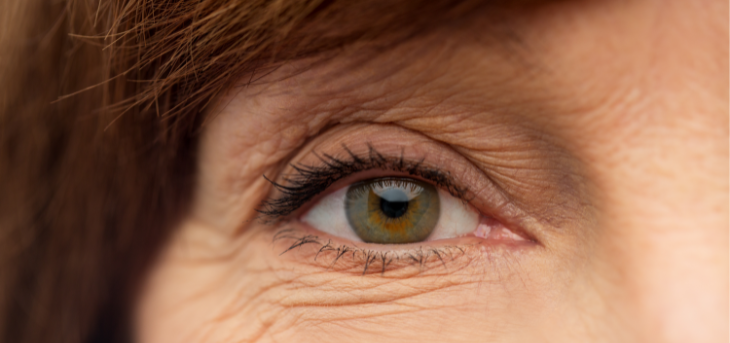National Eye Health Week

Published on 20 September 2024 01:58 PM
This year's National Eye Health Week (NEHW) will take place from 23rd to 29th September 2024, promoting the importance of good eye health and the need for regular eye tests for all.
We've teamed up with Thomas Pocklington Trust to help you take care of your eyes.
Are your eyes healthy?
If you are over 60, you can get your eyes tested for free. You may even be able to have the test done in your own home.
Regular eye tests are essential for good eye health. For most people, an eye test every two years is recommended. In some cases, your optometrist may recommend more frequent tests.
More than 50% of sight loss is preventable, so getting your eyes tested can help prevent or limit the damage caused by certain eye conditions.
So what are you waiting for? For help finding a local optician, call Age UK North Tyneside on 0191 280 8484 or visit www.nhs.uk/service-search/find-an-nhs-sight-test.
Problems with your eyes?
Issues such as red eyes, flashes or floaters, or any other problems should not be ignored. It is important to act quickly and seek help as soon as possible.
If you are having problems with your eyes, dial 111 from your mobile or landline for the free NHS helpline. You will be asked about your symptoms and directed to where you can get help, which in some circumstances might be a hospital eye emergency department.
For help finding local Minor and Urgent Eye Care services, call Age UK North Tyneside on 0191 280 8484 or visit primaryeyecare.co.uk/find-a-practice.
See, Say, Support
It is important to make every contact count when encouraging people to maintain good eye health. Seeking immediate support when experiencing symptoms can help prevent long-term problems.
See, Say, Support is a simple three-stage approach to help notice and address symptoms earlier.
- See. Notice the signs and symptoms of vision problems.
- Say. Be able to have a conversation about vision problems.
- Support. Signpost to suitable local services.
See
Notice the signs and symptoms of vision problems.
A person who begins to experience vision problems may be reluctant to talk about it, however there are signs you can look out for.
- They begin to bump into things.
- They move hesitantly or walk close to a wall.
- They grope for objects or touch them in an uncertain way.
- They squint or tilt their head to see.
- They request more or different lighting.
- They hold books or other reading material close to their face.
- They drop food or cutlery when eating.
- They have trouble making out faces, lettering on signs, etc.
- They do not notice stains on clothing or wear mismatched clothes.
- They act visually disoriented or confused in a familiar place.
- They trip on steps or kerbs.
- They indicate that they see halos or rings around lights.
- They complain of migraine headaches that give them blurry vision.
- They cannot see anything at night.
- They see spots in front of their eyes.
- They indicate that their eyes hurt.
- They see flashes of light frequently.
- They see double sometimes.
- Everything looks distorted to them.
Say
Be able to have a conversation about vision problems.
Health and eyesight can be sensitive topics. Here are some steps for approaching the conversation with tact and empathy.
- Choose the right time and place. Find a quiet, comfortable setting where you can have a private conversation without interruptions.
- Be empathetic. Start the conversation with a genuine expression of concern. You might say something like, “I noticed you were having some difficulty with reading small print. Is everything okay?”
- Express your observations. Share specific instances where you have noticed their struggle. For example, “I noticed that you were squinting when trying to read the menu at the restaurant the other day.”
- Be supportive. Let them know that many people experience changes in their vision, and it is perfectly normal. Assure them that an eye check-up is a proactive step towards taking care of their health.
- Suggest a solution. Encourage them to see an eye care professional who can provide a thorough examination and discuss any necessary treatments or corrective measures. See next section on Support.
- Be prepared for resistance. They might be in denial or scared about the prospect of vision loss. Be patient and understanding, and give them time to process the information.
Support
Signpost to suitable local services.
There are lots of local services that can provide support with eye health. For help accessing these services, customers can call Age UK North Tyneside on 0191 280 8484.
If you are having problems with your eyes, dial 111 from your mobile or landline for the free NHS helpline. You will be asked about your symptoms and directed to where you can get help, which in some circumstances might be a hospital eye emergency department.
For help finding local Minor and Urgent Eye Care services, visit primaryeyecare.co.uk/find-a-practice.
To find a local optician, visit www.nhs.uk/service-search/find-an-nhs-sight-test.
In an emergency, always call 999.
